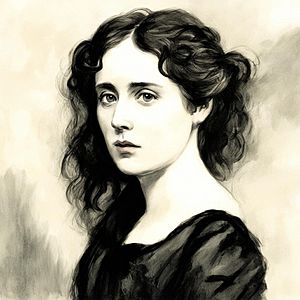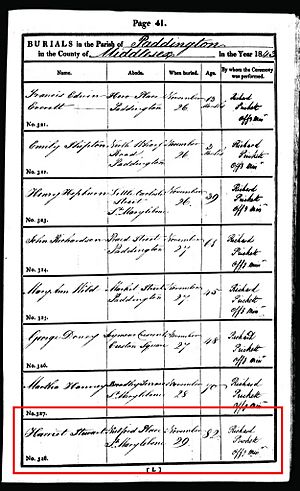Harriet Wainwright facts for kids
Harriet Wainwright Stewart (born around 1766, died 1843) was a talented British composer, singer, and writer. She was very good at managing her music career developing a subscription list of several hundred people and selling at least two of her compositions (Comala and Seringapatam) to subscribers.
Contents
Family and Early Life
There's a bit of a mystery about exactly when Harriet was born and who her parents were. Many sources say she was born in 1766. They often suggest her father was Robert Wainwright, a musician from Liverpool.
However, her burial record from St. Mary Paddington church says she was 82 when she died in 1843. If that's true, she would have been born in 1761. If she was born in 1761, it's unlikely Robert Wainwright was her father, as he would have been only 13 years old then!
It seems more likely that her father was Thomas Wainewright. His will, written in 1803, mentions Harriet as his daughter and the wife of Captain John Stewart. Thomas Wainewright might have been a special chemist (called an apothecary) for King George III.
In her will, Harriet mentions Robert Weinewright (died in 1841) as her cousin. His father, another Robert Weinewright, a Principal Clerk one of the six Clerks of Chancery, could have been the brother of Thomas Wainewright, Harriet's father.
Becoming a Musician
Harriet had some excellent music teachers. One was Dr. Richard Woodward, an organ player in Dublin. Another was John Worgan, a famous organist in London.
In the 1780s, Harriet moved to London. There, she met important people in the music world, like Charles Burney, a music historian. He was very impressed with her skills. He said he didn't know any other female composer in Europe who was better at writing complex music than Harriet.
Harriet's opera, Comala, was performed in London on January 26, 1792. An opera is a play where most of the words are sung, usually with an orchestra. Famous singers like Sophia Corri and James Bartleman performed the main parts. Six boys from the Westminster Abbey choir sang in the chorus. Even the famous composer Ignaz Pleyel attended and praised her opera! Harriet sold copies of the music for Comala to her many supporters.
Life in India
In 1796, Harriet moved to Calcutta, India. In 1801, she married Captain John Stewart. He was an officer in the East India Company's Bengal Army and later became a lieutenant colonel. Even after marrying, Harriet continued to publish her music using her maiden name, "Wainwright."
Her opera Comala was also performed in India, with Harriet herself singing the main role. The Governor of India, Richard Wellesley, even wrote a positive review of her work in the Calcutta Post newspaper in 1804.
Someone who admired Harriet sent her a poem about a British victory at a place called Seringapatam. They suggested she turn it into music. Harriet composed a chorus based on this poem, and she sold copies of it to her subscription list, just like her other works.
Later Years and Passing
Harriet and John Stewart left India in 1811. They were living in Perth, Scotland, when John passed away in 1820. Harriet eventually moved back to London.
In 1836, she published a book called Critical Remarks on the Art of Singing. This shows she was not only a composer and singer but also a writer who shared her knowledge about music. Harriet Wainwright Stewart passed away in 1843.
Her Will
Harriet Stewart wrote her will on February 4, 1839. A will is a legal document that says what a person wants to happen to their belongings after they die. Her will was officially approved on December 5, 1843.
Below is a transcript of Wainwright's will. Note: The words that are illegible are marked with a question mark.
Harriet Stewart widow of the late Lieutenant Colonel Stewart of 6 Nutford Place Briconstone(?) Square in the Parish of Marylebone in the County of Middlesex being sound in mind and body do make and publish this my last will and testament. I desire to be buried in Paddington church yard in the same grave with John Stewart in case I should die in or within ten miles of London but if not then in the nearest burial ground belonging to the Parish wherein I may die and that my funeral may be conducted in a respectable but uncostentatious manner. I direct my executors hereinafter named to collect and receive all monies which may be due to me at the time of my decease and to convert into money all stocks and funds which may belong to me and thereout in the first place pay all my just debts together with my funeral and testamentary expenses and as to any sum or sums of money which may appear by any writing or books of account I the hold as Trustee of or for the benefit of any other persons Idirect my executors to do all necessary acts for transferring the same to them.
In her will, Harriet asked to be buried in Paddington churchyard, in the same grave as her husband, John Stewart, if she died near London. She wanted her funeral to be respectful but not too fancy. She named two people, Mary Ann Longley and Thomas Farmer, to be the executors of her will. This means they were in charge of making sure her wishes were carried out.
Harriet left money to several people:
- £50 each to her cousin Robert Wainwright, Mrs. Mary Ann Longley (one of her executors), and Thomas Farmer (her other executor).
- £10 to Robert Bow, who was asked to arrange her funeral.
- £50 to Charles James Brown, as a sign of her friendship.
- £10 each to her servants for mourning clothes.
The rest of her money was given to two charities: the Strangers' Friend Society and the Benevolent Loan Society.
Compositions
Harriet Wainwright's music was published by companies like Cianchettini and William Napier. Many of her original music papers are kept safe at the British Library.
Here are some of her known compositions:
Operas
- Comala (the words were based on a text by Ossian)
- Don Quixote
Vocal Music
- Collection of Songs: Duets, Trios & Choruses (This was a collection of songs for one, two, three, or more singers.)
- "Merrily, Merrily Passes the Day"
- Seringapatam (a chorus, meaning a piece for a group of singers; the words were by an unknown writer)
 | James Van Der Zee |
 | Alma Thomas |
 | Ellis Wilson |
 | Margaret Taylor-Burroughs |



